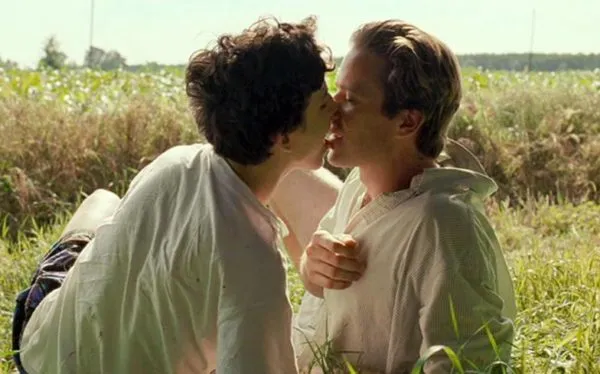

Behind the Casting of “Call Me by Your Name”: Why Timothée Chalamet and Armie Hammer Were Always Destined for the Lead Roles?
The 2017 film adaptation of Call Me by Your Name became a global phenomenon, earning critical acclaim, prestigious awards, and a lasting place in modern cinema. While the story itself captivated audiences, one of the lesser-known aspects of the production is how the casting process unfolded. Many actors and even musicians—including singer Troye Sivan—have expressed their desire to play one of the film’s iconic roles. However, the truth is that neither of the two male leads ever went through a traditional casting process.
Director Luca Guadagnino had already set his eyes on Timothée Chalamet and Armie Hammer long before production began. For Guadagnino, these choices were not open to negotiation: Chalamet was tapped for the role of Elio as early as 2013, while Hammer had impressed him years earlier with his performance in The Social Network (2010). This meant that the two stars were “directly selected” for their roles, bypassing the usual auditions that most actors endure.
In this article, we’ll explore why Chalamet and Hammer were considered perfect for the roles, what this casting decision reveals about the director’s vision, and how the unique path to casting contributed to the film’s enormous success.
The Rise of Call Me by Your Name
Before diving into casting, it’s important to understand the cultural impact of Call Me by Your Name. Based on André Aciman’s novel, the film tells a story set in 1980s Italy about identity, growth, and self-discovery. Released in 2017, the adaptation quickly rose to fame, praised for its cinematography, evocative storytelling, and nuanced performances.
Its release aligned perfectly with a growing appreciation for films that balance art-house style with mainstream appeal. By the time it hit the big screen, Call Me by Your Name was already on track to become one of the most talked-about films of the decade.
Timothée Chalamet’s Casting as Elio
One of the most surprising facts about the film is that Timothée Chalamet didn’t compete with other actors for the role of Elio. Director Luca Guadagnino had already made his choice in 2013, years before filming began.
Why Chalamet? For Guadagnino, the answer was clear:
-
Natural Talent: Even before his breakout role in Lady Bird and later Dune, Chalamet was known for his naturalistic acting style. His ability to bring vulnerability and authenticity to complex characters made him an ideal fit.
-
Youthful Energy: The role of Elio required someone who could portray intellectual curiosity, teenage insecurity, and emotional depth simultaneously. Chalamet embodied this balance seamlessly.
-
Versatility: Guadagnino recognized early on that Chalamet had the versatility to transition between indie films and large-scale productions. Choosing him for Elio was not just about this film—it was about showcasing an actor destined for long-term greatness.
By casting Chalamet years in advance, Guadagnino ensured that Elio’s role would be filled by someone who could evolve with the film’s vision and grow into the character over time.
Armie Hammer as Oliver
While Chalamet’s casting was a calculated choice, Armie Hammer’s selection came from a spark of admiration that began years earlier. Guadagnino admitted that he had been captivated by Hammer after watching him in David Fincher’s The Social Network (2010). Hammer’s portrayal of the Winklevoss twins displayed charisma, intelligence, and a commanding presence that stuck with the director.
For Guadagnino, Oliver needed to embody both confidence and mystery. Hammer brought:
-
Screen Presence: Hammer’s height, posture, and voice gave him a natural authority that fit Oliver’s character perfectly.
-
Charm and Warmth: Despite Oliver’s intellectual brilliance and aloof nature, the character needed to remain approachable. Hammer managed to balance sophistication with warmth.
-
Pre-established Recognition: While not an A-list superstar, Hammer had built credibility in Hollywood by 2017. His presence added weight to the project without overshadowing Chalamet’s fresh breakout energy.
In essence, Guadagnino had “fallen in love” with Hammer’s work years earlier, and the memory of The Social Network ensured that Hammer was always his top choice.
No Casting Process: A Rare Move in Hollywood
What makes this story remarkable is that neither Chalamet nor Hammer ever auditioned for their roles. In an industry where actors often go through multiple callbacks, screen tests, and chemistry reads, this decision stands out.
By removing the audition process, Guadagnino demonstrated:
-
Confidence in His Vision: He knew exactly who he wanted, and he trusted his instincts.
-
Efficiency in Production: Without casting delays, the film could move into development with clarity and direction.
-
Commitment to Authenticity: Guadagnino believed that Chalamet and Hammer naturally embodied Elio and Oliver. Rather than trying to “find” the right actors, he simply trusted his first impressions.
This bold move might have been risky, but it ultimately paid off. The chemistry between Chalamet and Hammer was undeniable, and their performances became a cornerstone of the film’s acclaim.
Troye Sivan and Other Stars Who Wanted the Roles
After Call Me by Your Name became a worldwide hit, stories surfaced about how many artists admired the film and wished they could have been part of it. Among them was singer Troye Sivan, who openly shared his interest in playing one of the leads.
Sivan’s comments reflected how coveted the roles had become. However, by the time the film was released, it was clear that the casting had already been sealed years earlier. Even if the clock could be turned back, no other actor—no matter how talented—would have had the chance to take on Elio or Oliver.
How Casting Choices Shaped the Film’s Legacy
The decision to “directly select” Chalamet and Hammer didn’t just influence the film’s production—it shaped its legacy. Their performances carried the film to critical acclaim, leading to an Academy Award for Best Adapted Screenplay and multiple nominations across prestigious awards ceremonies.
-
Chalamet’s Breakout: The role of Elio catapulted Chalamet into international stardom, earning him an Academy Award nomination and solidifying his place as one of the most promising young actors of his generation.
-
Hammer’s Reinforcement: Hammer’s career benefited from the film as well, proving his ability to carry nuanced roles in addition to mainstream productions.
-
Guadagnino’s Reputation: By trusting his instincts, Guadagnino reinforced his status as a visionary director unafraid to take unconventional risks.
Lessons from the Casting Story
The behind-the-scenes journey of Call Me by Your Name offers valuable insights into the filmmaking process:
-
Instinct Matters: Great directors often trust their gut when making casting decisions. Guadagnino’s unwavering belief in Chalamet and Hammer shows how instinct can be more powerful than auditions.
-
Talent Finds Its Way: Chalamet and Hammer didn’t have to prove themselves through endless callbacks. Their previous work and natural qualities spoke volumes.
-
Chemistry Is Key: Casting isn’t only about individual talent—it’s about how two actors play off each other. The synergy between the leads was essential to the film’s emotional resonance.
Conclusion: A Casting Story That Became Legend
The success of Call Me by Your Name is a testament to many factors—beautiful direction, stunning cinematography, and a compelling script. Yet one of the most fascinating aspects of its history lies in its casting.
Despite the interest of other actors and singers, including Troye Sivan, the film was never open for competition. Timothée Chalamet and Armie Hammer were always destined for the roles of Elio and Oliver, handpicked by Luca Guadagnino years before filming.
This rare decision not only ensured the film’s authenticity but also created a legacy of performances that will be remembered for generations. It’s a powerful reminder that in Hollywood, sometimes the perfect actor doesn’t need to audition—they simply embody the role from the very beginning.




















